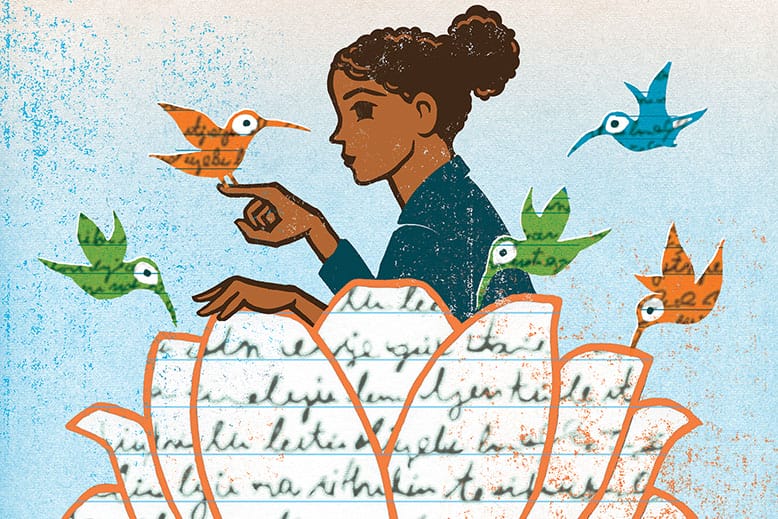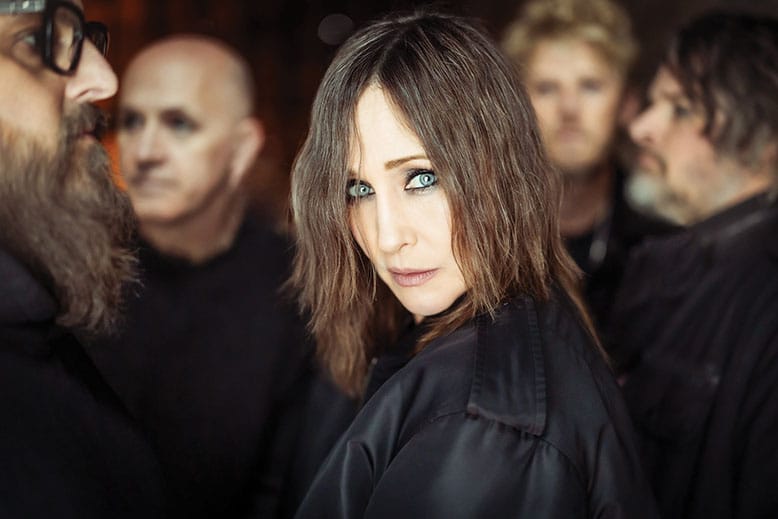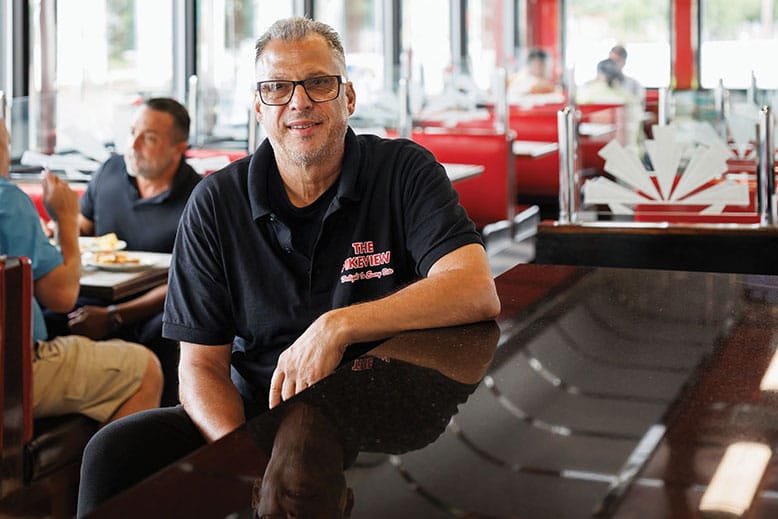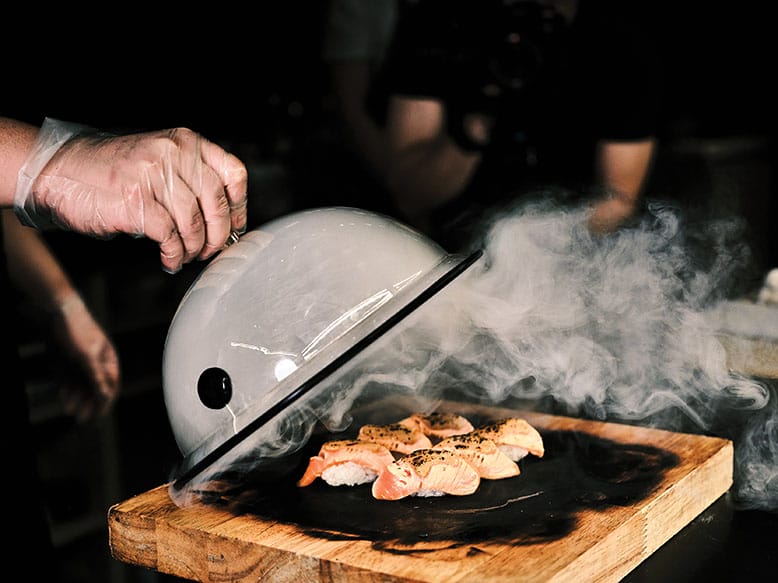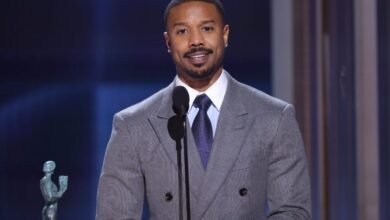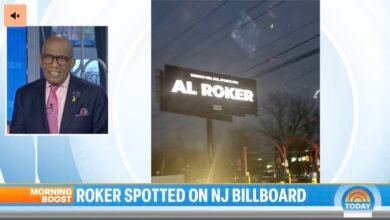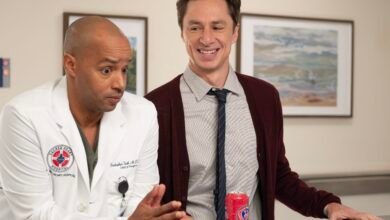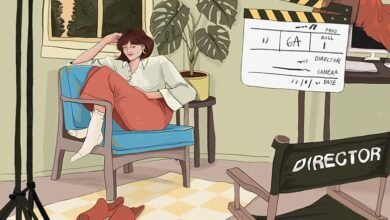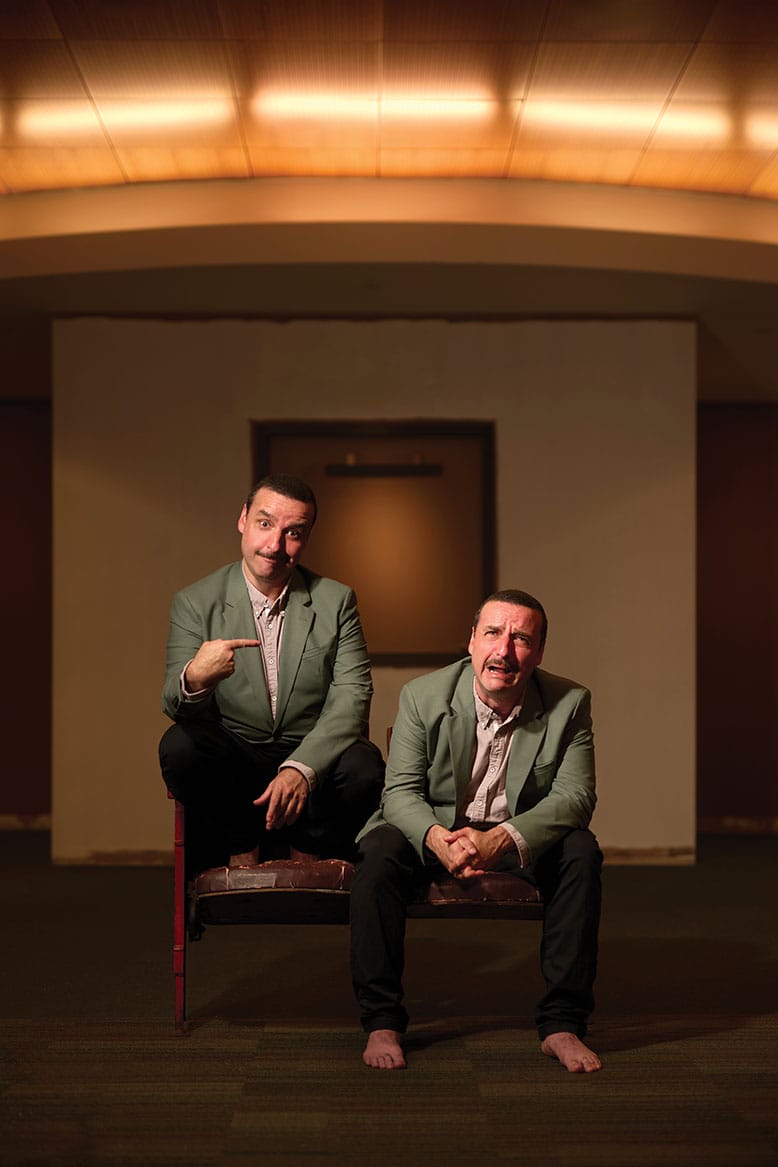

David Krumholtz Photo: Dave Moser
Years ago, I walked into a coffee shop near my house in Bergen County and saw one guy talking to another guy. The second guy looked familiar. When the second guy left, I went up to the first guy. “Who was that?” I said. “Oh,” he said. “David Krumholtz. You know him.”
He was sort of right. I didn’t know Krumholtz, but I knew him. For the last 30 years, Krumholtz has been one of the most prolific and versatile actors in America, appearing on screens both big (as a younger man he was in everything from The Santa Clause to Harold & Kumar Go to White Castle, and later, a little movie called Oppenheimer) and small (he starred in the procedural Numb3rs and has recently popped up in Poker Face and The Studio). He’s done comedy. He’s done drama. He’s done Broadway. And soon, he’s doing Springsteen—he plays a key role in this fall’s Deliver Me From Nowhere, starring Jeremy Allen White as Bruce. Krumholtz, 47, and his wife, Vanessa, live with their two kids in Wyckoff. We met at that same coffee shop where I first saw him talking to the other guy.
This conversation has been edited and condensed for clarity.
New Jersey Monthly: You are in New Jersey now, but you weren’t born here. You’re a native New Yorker.
David Krumholtz: I probably didn’t step foot into New Jersey until I was an adult. This is not a joke. No, wait. My day camp took me to Action Park, the amusement park in Vernon. I must have been around 11.
Famously nicknamed Class Action Park, of course, because so many kids got hurt. There’s a documentary about it. Did you get injured?
Yes.
Really?
I mean, scraped up. The documentary doesn’t quite really encompass it because it doesn’t talk so much about the Alpine Slide, which was wildly dangerous. I went to Great Adventure. I was here for the amusement parks. But other than that, the truth is that the day I met my wife, I scored brownie points with her based on how much I made fun of New Jersey.
And she’s a native.
Yes. It was a little running joke. When I first met her parents in Rockaway Township, I said to myself, My God, this is like… You know, look at these bumpkins. I was a New York snob. Which is funny, because I’m from Queens. I grew up with the same unattainable skyline, just from the other side.
When you were a kid, were you all caught up in the cultural institutions of the big city?
I was very much immersed in subway culture. I appreciated Queens. I loved Forest Hills. But I was a get-on-the-train, go-into-the-city-every-weekend kid. At first, obviously, with my parents, and then with my friends, and I ended up going to high school in Manhattan. Manhattan was just…well, there didn’t need to be anywhere else. I was fully subscribed.
At 13, you auditioned for a Broadway play.
I was a funny kid. I liked being funny. It saved my ass. My elementary school was a little bit milquetoast, but when I got to junior high school, it was a confluence of neighborhoods coming together, a little more ethnically varied, and as a result, it was intimidating. I needed to be funny, because I was watching my friends get beat up.
So did that lead to acting?
Well, I made a teacher laugh. His name was Lon Blais. He was an actor himself, and he also happened to be an English teacher in a junior high school in Queens, at Halsey Junior High. He got wind of this open-call audition for this play and came to me and said, “You look like Judd Hirsch, and they’re looking for someone to play Judd Hirsch’s son.” I knew who Judd Hirsch was. I was a Taxi fan, and I watched Dear John every week. And I agreed—yes, I do look like him. And yes, I am a funny kid. But I had no hopes of really getting the job. It was something to do on a Saturday, a change from the norm.
So you didn’t even think forward to a moment when you’d be an actor?
I guess I knew that I was a talented person. I knew I was funny and could do accents. My grandmother was extremely talented and very extroverted. I loved watching her, and I tried to emulate her. My dad was also very, very funny. But I showed up without expectation. There were a thousand kids in a gym at a Universalist Church in Manhattan. I remember a good portion of them were Asian, Black and Hispanic—to play Judd Hirsch’s son. Mostly, it was people just trying to get in front of a casting director.
But you got the role. Was it transformative right away? Were you sold on the idea of being in front of a crowd?
I’ve only realized this recently, but it was a stroke of divine intervention, because I was headed in a bad direction. If you were to look at my stat sheet as a child, it would likely add up to major difficulty in my late teens. My family had no money—and I mean no money—so college wasn’t going to be an option, or else I’d be in debt for a very, very long time. I was already quite apathetic at 13, and I do have an addictive personality. There was a lot of self-loathing. So it was transformative, yes, in the way that suddenly, this kid who hated himself was suddenly everyone’s favorite kid.
Everyone including you?
I remember walking around and telling everyone, “I’m going to win a Tony for this” for months and believing it. And then when I didn’t get nominated for a Tony, feeling very angry and bitter. It was just an ego explosion, because there was nothing there before. Even my family was nicer to me. My step-grandfather thought I was an idiot until suddenly I was on Broadway and I became fascinating.
You went from that to movies: Addams Family Values, where you’re the kid at camp with Wednesday, played by Christina Ricci; The Santa Clause, as Bernard the Elf. That must have been even more intoxicating than Broadway.
Correct. I thought, Oh, this is how it’s always going to be, and I’m never going to stop. Everyone loves me, and I thought, What’s not to love? I went from What’s not to hate? to What’s not to love? too quickly.
I remember first really taking notice of you in Slums of Beverly Hills in 1998 and then in Harold & Kumar Go to White Castle in 2004. This is the first of the Jersey-themed or Jersey-adjacent movies in your discography, by the way. Harold and Kumar are looking for a White Castle in Cherry Hill. You don’t have a ton of screen time in those movies, but you really pop.
Let’s use a tired baseball analogy. I think great character actors are sort of cleanup hitters. You have your leadoff man, who gets the game started. And then another lead actress who keeps the inning going, and then maybe even a third, and then there’s the guy who is put in the position to knock it out of the park. The great ones do that. Willem Dafoe, say. The beguiling characters. Just the faces are fascinating. As a character actor, you have to have something behind the eyes.
You were a colead, though, on TV, on Numb3rs, which ran on CBS from 2005 to 2010. Someone who had done both film and TV told me once that she loved series life. Film was unpredictable in terms of the finances and the psychology. You bond intensely with people, and a few months later, the shoot—and your employment—ends. A show is a regular job. You drive to the studio from home and drive back.
That was exactly my experience. I was very grateful to be getting paid way more to do television than I would be in films. Plus I had a place to go, a routine. It was ten months of work a year, and then two months off where I could do nothing or do a small, tiny independent film that I suddenly had the luxury of doing. Do I fiend for that experience again? Very much so.
Temperamentally, do you always like that something-behind-the-eyes energy, or would you like more lead roles?
I like both. I’ve made eight movies with myself as the lead character, and they have been drastically underseen. We’re talking barely distributed, barely watched. I just hope that one day, when I die, someone does a marathon of those films over the course of two days at the Nuart in L.A. The David Krumholtz as Lead Festival.
Long careers have ups and downs. Was there a point where you thought that you were in a down?
I got married in Los Angeles in 2010. I was diagnosed with thyroid cancer in 2011. Vanessa and I had our first kid in 2014. In the midst of that, we moved here, largely because my dad was dying of this very cruel and rare neurological disorder. He had to go to a care facility in New Jersey, and I was his sole caretaker. Right after we moved here, a show I created and wrote and starred in, Gigi Does It, got picked up. So I was suddenly back in L.A. doing something I’d never done, which was showrunning. When I came back, I was 230 pounds, still having thyroid issues. I would just look at food and gain weight. I had fatigue. The show came out and nobody cared about it. The work was unrequited, and I was wiping my dad’s ass and raising two children. When things started to recover a bit in 2018 or 2019, the pandemic hit and I was out of work for a year and a half, which was really shocking and hard. I was barely getting by, hanging on by a thread.
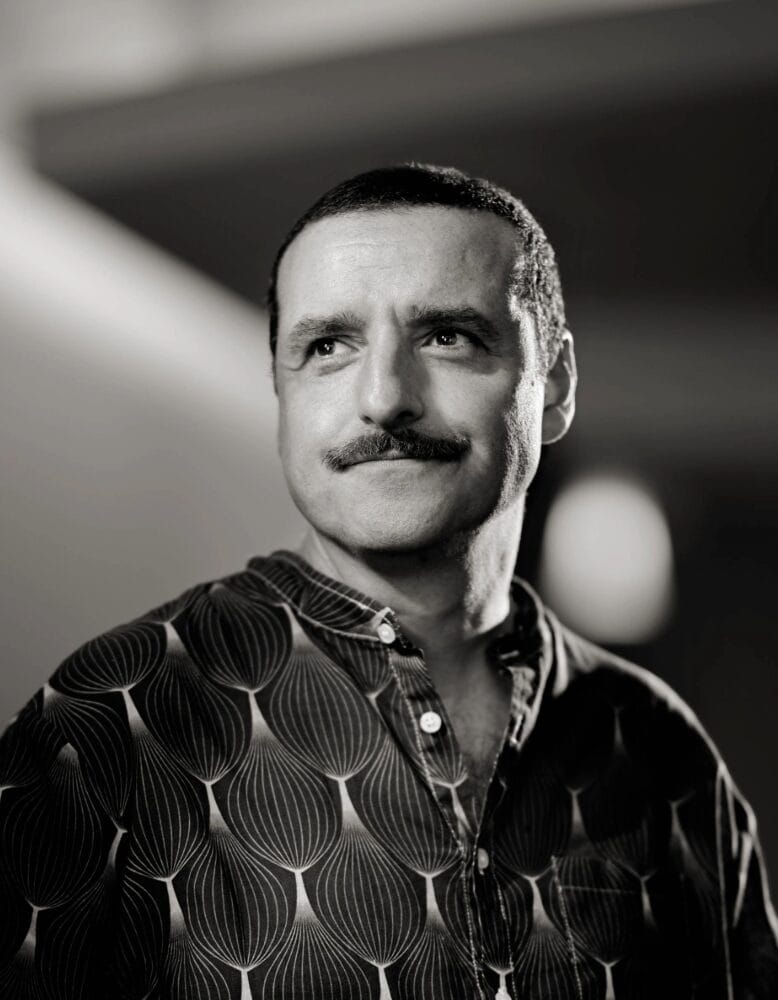

Photo: Dave Moser
So how did that turn around?
Well, Chris Nolan very much saved my ass. I don’t know if he knew he was doing that, even though I did tell him afterwards.
This brings us to Oppenheimer, our second New Jersey movie, since much of it takes place in Princeton. You play Isador Rabi, a physicist and friend of Oppenheimer’s.
The cool thing was that I knew that my role really meant something more than one scene or a line here and there. I knew that it was my little secret that I could release when we stopped promoting it. The problem then was that the moment it came out and became a billion-dollar movie, the strike hit and I couldn’t capitalize.
Around the same time you went back to Broadway to star in Leopoldstadt.
I filmed Oppenheimer before the play, then I did the play, then the movie came out. I certainly didn’t expect to be saved twice. I’m happy with having been in Oppenheimer, and then suddenly, Tom Stoppard is calling. Another rebirth.
This time as a Jersey guy.
Right. I love New Jersey deeply. I wouldn’t want to live anywhere else. My wife is working. My kids are going to school. I play with my Grateful Dead cover band, Her Angels in Flame. One huge factor is the friends I’ve met, in particular three very smart people who were born and raised here. Two of them are beer brewers who own a brewery called Two Villains, which now operates out of a place called Alias Brew Works in Vernon, where Action Park was. I just thought, Wow, these guys are so funny and so brilliant, my friends Jon and Sean. Oh, see that, dumb New York snob? And then the third guy is a local-legend musician, older, a guy named Ray Longchamp. I wasn’t sure I could find people like that here, so it was extra special when I did.
We’ve gone through your quasi-Jersey movies. Now you’re in one that’s absolute bullseye: the Bruce Springsteen biopic Deliver Me From Nowhere, starring Jeremy Allen White as Springsteen. Before we get to the film, I want to ask your opinion about music biopics in general.
They are hard to get right. The problem with music biopics is you’re counting on the popularity of the artists to carry the crowd, and so you’re dealing with a very discerning fan base. It’s a very sensitive thing if you go way outside the box and tell the story in a less formulaic or less familiar way. There are great ones, though. I saw a David Bowie stage musical, Lazarus, with Michael C. Hall and Cristin Milioti, and I was blown away. I’ve been trying to write one myself for a couple of years.
About the Dead?
Yes. My thing is that it has to be an event film with an intermission, an experience that feels like a concert. I keep thinking about not only what I would want, but what my dearest Deadhead friends would want, which is to experience something that talks about the ethereal quality of the music more than it talks about who the people were. Jerry Garcia wouldn’t want to make a movie about his drug addiction. Plus it’s repetitive, because the music’s already told me those things.
This movie looks at a particular era in Springsteen’s artistic development, the period around the Nebraska album. In the early eighties, he recorded a batch of demos in this stark acoustic mode, and when those were rerecorded by the band, he found that he liked the feel of the demos better.
Yes. I read this script and loved the approach of it. It is about fame and coping with the pressures of success. Be careful what you wish for, because it may happen, and you may just want to crawl back into a hole. I related to that.
I worked on a book with Little Steven, and he told the story of the moment when that album was presented to the label.
That’s the scene I’m in. I play Al Teller, the head of CBS Records. Jon Landau, Springsteen’s manager, invites me to his office and plays the album, and I think it’s a joke. I can’t believe that this is what we’re going with, and I can’t fathom why anyone would not grab the brass ring after The River. Jon Landau, who is played by Jeremy Strong, faced a real dilemma. When do you tell someone they might be making a mistake versus supporting them regardless?
Were you a Springsteen fan as a kid?
Yes. When I was 16, in high school, I had a crush on a girl named Sarah, and I pretended to write a poem that she thought was amazing, but it was “The River.” I didn’t tell her it was Bruce Springsteen.
Did it work?
It totally worked. She was very moved.
Did your relationship to him and his work change as you got older, and he got even more famous?
I’ll tell you a funny story. When I was 18, I filmed a pilot for a show called Suddenly Susan, which ended up becoming a series, but with some of the actors, including me, replaced. That original pilot was written by a writing team of Jane Milmore and Billy Van Zandt—who happens to be the younger brother of Little Steven. Billy and Jane and I got along famously. One day, they were going to a party down the Shore. “You should come with us,” they said. It was a somewhat lively party, and someone brought up Bruce Springsteen. “I’m not the biggest fan,” I said. All I meant was that I wasn’t an obsessive fan. Not the biggest doesn’t mean not at all! But I swear, it was that record-scratch moment where the place goes dead silent and everyone looks at you like they are about to throw you in the river.
Did Springsteen come to set?
He did, and he was the nicest person ever. I got a picture with him. Jon Landau was there, too. They were in great moods. When I went up to Bruce, I made a joke. I said, “And what is your involvement with this film?” He thought that was funny. I made him laugh.
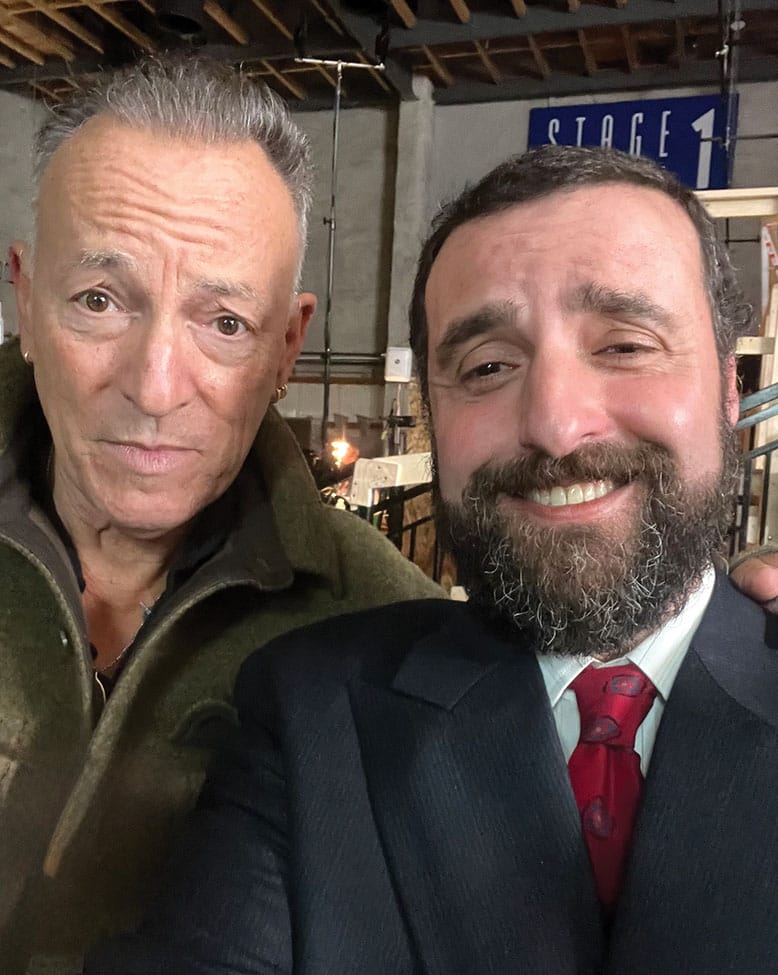

Krumholtz meets Springsteen while filming Deliver Me From Nowhere. Photo: Courtesy of David Krumholtz
I want to end with a lightning round of other New Jersey icons.
Okay.
Redman, from Newark.
The King of New Jersey. Underrated. A monstrous lyricist.
Abbott and Costello. Abbott’s from Asbury Park and Costello is from Paterson.
Wow. I had a dream last night that I was related to Bud Abbott. I am not. Lou Costello was born funny, which is the highest compliment I can give to any comedian. And Bud Abbott recognized that, also very important.
Dave Thomas of Wendy’s, who is from Atlantic City.
Better than White Castle.
Oh, wow. That’s betraying the franchise.
You’re goddamn right.
Before you said, “Wait till they get a load of me,” so let’s end with Jack Nicholson. He’s from Neptune City.
Top-three actor all time. It’s him and DeNiro and…Cate Blanchett? Klaus Kinski? Kinski is the most committed, but also batshit, so maybe I shouldn’t give him so much credit? Cate Blanchett.
Ben Greenman is the author and coauthor of more than two dozen books and edited Unrequited Infatuations, the bestselling memoir by New Jersey icon Stevie Van Zandt.
Digital tech: Justin Chiu. Assistants: Jason Blake & Ruby Moser. Location provided by Corey Sturmfels, Realtor, Christie’s International Real Estate.

